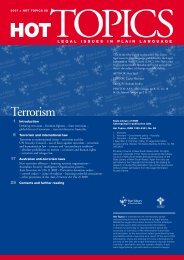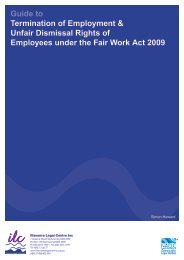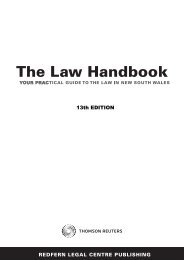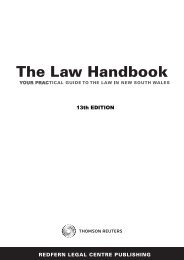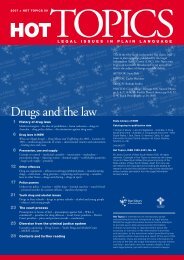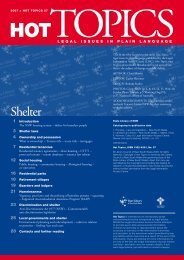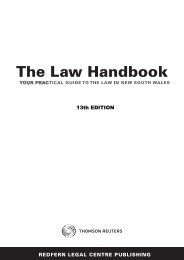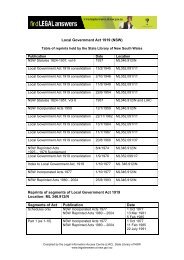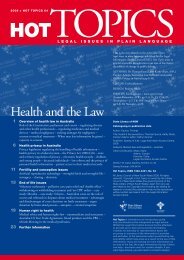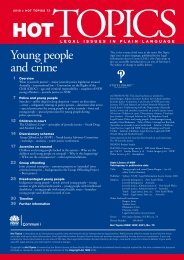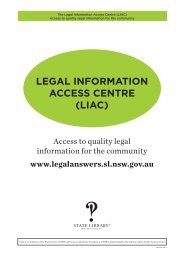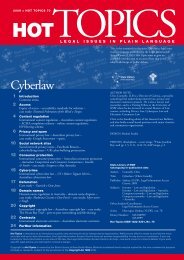Hot Topics - Issue 65: Human Rights - Legal Information Access ...
Hot Topics - Issue 65: Human Rights - Legal Information Access ...
Hot Topics - Issue 65: Human Rights - Legal Information Access ...
Create successful ePaper yourself
Turn your PDF publications into a flip-book with our unique Google optimized e-Paper software.
However, prohibiting discrimination (and proscribing<br />
racial vilification) falls short of implementing the range<br />
of standards guaranteed in the international conventions<br />
on human rights. Also, the existing prohibitions in<br />
Australian law against discrimination on enumerated<br />
grounds are not ‘entrenched’. That means that they<br />
can be overridden by subsequent laws if the Parliament<br />
wished, rather than setting a standard that subsequent<br />
laws must satisfy to be valid laws. For an example<br />
of legislation where the prohibition against racial<br />
discrimination was overridden by an Act of Parliament,<br />
see Indigenous Australians and human rights on page 28.<br />
Under the HREOC Act, HREOC can also investigate<br />
alleged breaches of ‘human rights’ as narrowly defined<br />
in that Act: see ‘Note’ on page 19. The rights that<br />
HREOC is empowered to deal with are:<br />
> International Covenant on Civil and Political <strong>Rights</strong><br />
> International Labour Organisation Discrimination<br />
(Employment) Convention ILO 111<br />
> Convention on the <strong>Rights</strong> of the Child<br />
> Declaration of the <strong>Rights</strong> of the Child<br />
> Declaration on the <strong>Rights</strong> of Disabled Persons<br />
> Declaration on the <strong>Rights</strong> of Mentally Retarded<br />
Persons<br />
> Declaration on the Elimination of All Forms of<br />
Intolerance and of Discrimination Based on Religion<br />
or Belief.<br />
However, it is not unlawful to breach those rights.<br />
HREOC has the power to investigate and to make<br />
recommendations. For example, everyone has the right<br />
not to be required to perform ‘forced or compulsory<br />
labour’ and the right to have a criminal trial ‘within a<br />
reasonable time’. If a right like this is breached, HREOC<br />
can investigate a complaint, try to resolve it and make<br />
recommendations, but no further action can be taken<br />
by a complainant in the courts. Reports of HREOC’s<br />
investigations into human rights breaches under the<br />
HREOC Act are tabled in Federal Parliament.<br />
In 2008, the Rudd Government announced that it<br />
would support a national community consultation on<br />
the most appropriate methods of protecting human<br />
rights and $2.099 million was provided by the 2008-09<br />
Federal Budget for that process.<br />
HuMan riGHTs in ausTralian cOurTs<br />
During the 1990s and into the 21st century there<br />
has been a significant move in Australian courts<br />
towards accepting reference to Australia’s human rights<br />
obligations as a basis for interpreting Australia law.<br />
image unavailable<br />
Mal Brough (then Federal Minister for Aboriginal Affairs) confronted by angry protesters as he opens a new Police<br />
station, on a visit Mutitjulu community next to Uluru, Northern Territory, 30 June 2007. The Mutitjulu community was at<br />
the centre of the Howard Government’s Northern Territory intervention.<br />
Photo: Lyndon Mechielsen, The Daily Telegraph © Newspix/News Ltd.<br />
the operation of international human rights law in australia 23



